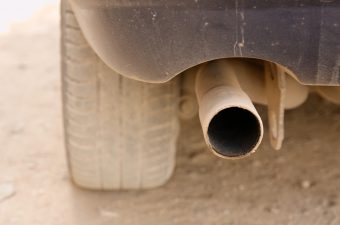Emissions tests that are impossible for carmakers to cheat show that almost all diesel car models launched in Europe since the “dieselgate” scandal remain highly polluting.
The test uses a beam of light to analyse the exhaust plume of a car as it passes and automatic number plate recognition to link the measurement to a specific model. More than 370,000 such measurements taken in the UK, France and other countries have been compiled into new rating system called The Real Urban Emissions Initiative (True) and made available to the public on Wednesday.

Volkswagen was exposed as cheating emissions tests in September 2015. But, without breaking the letter of the law, almost all car manufacturers were producing diesels that emitted far more in real-world driving conditions than in official lab-based tests. This was done by optimising vehicles to pass standardised tests, but the beam test is conducted as cars pass and so cannot be manipulated.
The True analysis shows that new diesel models released in 2016 were still on average five over times above the EU’s official baseline limit of 0.08mg of nitrogen oxides (NOx) per kilometre. The 2017 models were a little cleaner, but still nearly four times over.
NOx pollution is at illegally high levels in numerous EU nations. It is estimated to cause 23,500 early deaths a year in the UK, where government plans to cut pollution have been repeatedly ruled so inadequate as to be illegal. Separate research published on Wednesday calculates that diesel cars and vans, which make up less than half the UK’s fleet, cause 88% of the health damage from light vehicles.
The beam tests are continuing and will be able to single out highly polluting models in future. “I see this remote sensing mostly as a screening tool, to see which vehicle models behave suspiciously,” said Peter Mock, at the International Council on Clean Transportation which produced the True rating in partnership with the FIA Foundation and other groups.
Those models highlighted as highly polluting could then be tested by putting a portable emissions measuring system (Pems) on a car, which is more accurate but also much more expensive. Diesel cars shown by the True data to emit far more NOx than the official baseline when on the road included two-litre Fiat Chrysler models – 18 times more – and 1.6-litre Renault Nissan models – 14 times more – though the cars passed legally required tests.
“If I was a customer, I would look at these figures at the moment and have to conclude I should not buy a diesel car,” Mock said, noting that the petrol versions are far cleaner. “Even Euro 6 [the most recent standard] diesel vehicles are not performing well at the moment so pretty much all of them should not have access to city centres.”
Greg Archer, at campaign group Transport & Environment, which is part of the True initiative, said: “The True rating exposes the legacy of dieselgate – tens of millions of dirty diesels that are still on the roads producing the toxic smog we daily breathe. It identifies the worst performing models and regulators must act to require carmakers to clean these up.”
The True rating is a “brilliant” screening tool and also good at monitoring pollution from cars as they get older and enter the used car market, said Nick Molden, chief executive of Emissions Analytics, which performs 300-400 Pems tests every year on new car models and publishes another rating system called the Equa index.
But Molden cautioned that the True rating system, which averages the same models across several years, will not show when the latest model has radically cut its pollution. He cites the example of a Mercedes model that improved significantly between 2014 and 2017: “It went from quite dirty to really quite clean.”
Since September 2017, new cars have had to pass a road-based test, but an EU compromise with the industry means emissions can still legally be double the baseline limit. Molden said car manufacturers are now very wary of being caught launching cars that fail emissions tests and some new diesel models are very clean, sometimes 50% below the baseline.
Mike Hawes, chief executive of the Society of Motor Manufacturers & Traders, said: “Thanks to massive investment, each generation of vehicle is more advanced than the last, with significantly lower pollutant emissions. This is acknowledged by the [True] report, and consumers can be assured that new cars on sale today are the cleanest ever and fully compliant with EU emissions standards.”
The new analysis of the health impact of diesel in the UK was conducted by experts at the University of Oxford and University of Bath in advance of Clean Air day 2018 on 21 June. They used data on the number of vehicles and mileage, along with government estimates of the harm caused by pollution.
The researchers found the health damage from diesel vehicle emissions are about 20 times greater than from electric vehicles and five times more than petrol vehicles. Christian Brand, at the University of Oxford, said: “Cars and vans are responsible for 10,000 early deaths each year, and diesel vehicles are the main problem unfortunately.”
Source: Guardian


